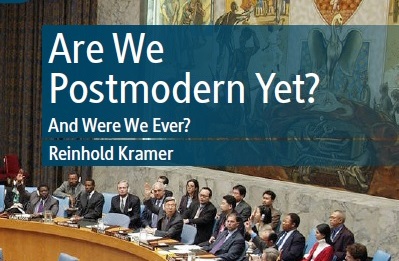
By
Reinhold Kramer
February 2020
Print Version
What you need to know
This book explores a variety of important social changes, including the resistance to objective measures of truth, the rise of “How-I-Feel” ethics, the ascendancy of individualism, the immersion in cyber-simulations, the push toward globalization and multilateralism, and the decline of political and religious faiths. Attempts to replace broad cultural narratives by self-focused narratives or narratives tied only to one’s group have proven inadequate, and revised narratives, such as selective adherence to tradition, pluralist adaptations, and humanism, have been more effective replacements.
Why this research is important
When pressed, many people in the contemporary era claim that moral choices depend on “How-I-Feel,” a stance that coheres with the postmodernist notion that human ethics lack a foundation. Traditional faiths and modernist reasoners (usually consequentialist) have often failed to respond satisfyingly to the postmodern dilemma, the lack of agreement about ethics. However, no society functions without significant levels of ethical agreement, and postmodernist skepticism fails to account for evolution-based ethical universals, for reasoning about ethics, and for increasing agreement about human rights.
How this research was conducted
The research began by distinguishing “postmodernism,” a philosophical skepticism that affirms individual and cultural relativity, from “postmodernity” or the contemporary era. Surveying assessments of the era by
experts in various fields, and depictions in contemporary artistic works such as Dallas Buyer’s Club and Super Sad True Love Story, the book considers whether contemporary social practices—from credit card debt to #MeToo to statistics on UN peacekeeping forces—accurately reflect the experts’ claims.
What the researcher found
No single answer is possible to the book’s title question. In terms of truth, a postmodern overvaluing of emotion appears both on the Right (Trump’s speeches, neuro-marketing) and on the Left (multiple ‘knowledges,’ micro-aggressions), but the over-valuing of emotion is a very old evolutionary adaptation, and it sits alongside new non-postmodern ways of assessing truth, such as fact-checking websites.
In regards to individualism, the contemporary era is strongly postmodern. The ascendancy of individualism has resulted in self-indulgence, in declines of civility, empathy, and social commitments, and in a social distancing that has fostered unhappiness. Nevertheless, the constructive aspects of postmodern individualism—freedom from communal forms of oppression and increasing freedom of the individual to decide the balance between pleasure and self-control—argue strongly against returns to national or religious communalism.
Cyber-culture is another ambivalent case of the postmodern. The Internet’s visual simulations—despite astounding gains in pluralism, creativity, and information—weaken memory and literacy, crowd out reasoned analysis, give the illusion of multi-tasking, undermine human connections (not least via Facebook and texting), and emphasize the ‘now’ at the expense of a full engagement with the past.
Politically, the continuing power of the nation and group identities works against the postmodern, yet the privileging of the consumer over the citizen reinforces postmodern individualism. On the international level, a postmodern deregulatory trend of economic globalization has severely restrained national sovereignties. In trade and in multilateral institutions such as the EU and the UN, the world is increasingly postmodern, often in a beneficial way, with no single empire that can dictate terms.
In general, despite commentators who agitate on behalf of traditional ethics, or science-oriented ethics, or market-based ethics, or other-focused ethics, postmodernity has most often been marked by a provisional consensus about contractarian processes and human rights duties.
How this research can be used
This research can be used to critique both parochialism and an undefined pluralism, showing that contemporary western societies (especially Canada and the US) operate at four layers of depth—evolutionary adaptations, traditional faiths, scientific modernity, postmodern skepticism—and that none of these can be ignored in our decision-making. Negotiated contracts between positions offer the best way forward.
About the Researcher
Keywords
- ethics
- evolutionary adaptions
- globalization
- individualism
- modernity
- multilateralism
- postmodernity
- tradition
- truth
Publications Based on the Research
Reinhold, K. (2019). Are we postmodern yet? (And were we ever?). New York: Palgrave MacMillan.
Editor: Christiane Ramsey
Read more BU Research
Research at Brandon University follows comprehensive policies designed to safeguard ethics, to ensure academic integrity, to protect human and animal welfare and to prevent conflicts of interest.

